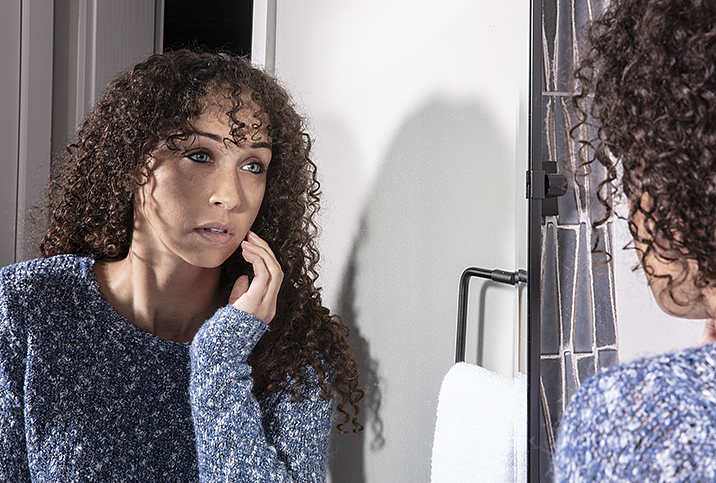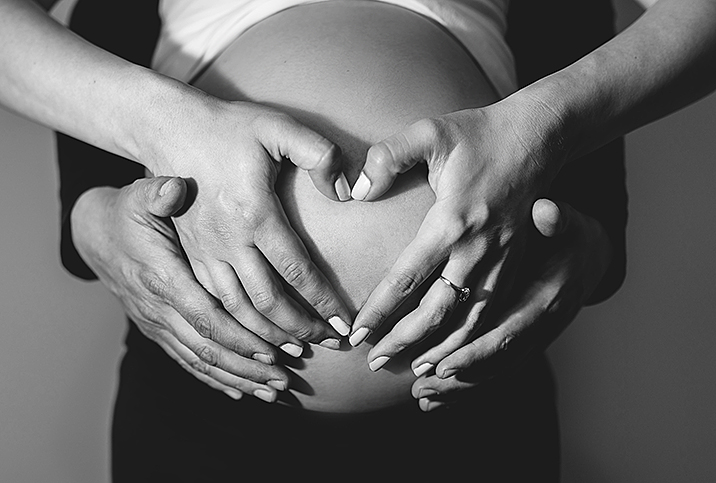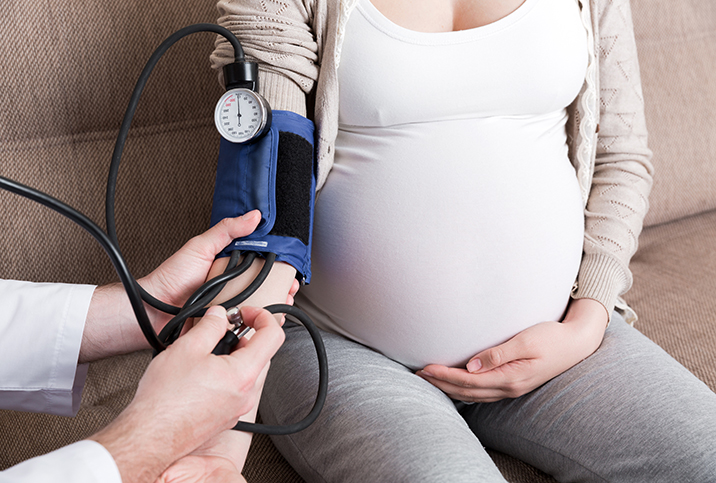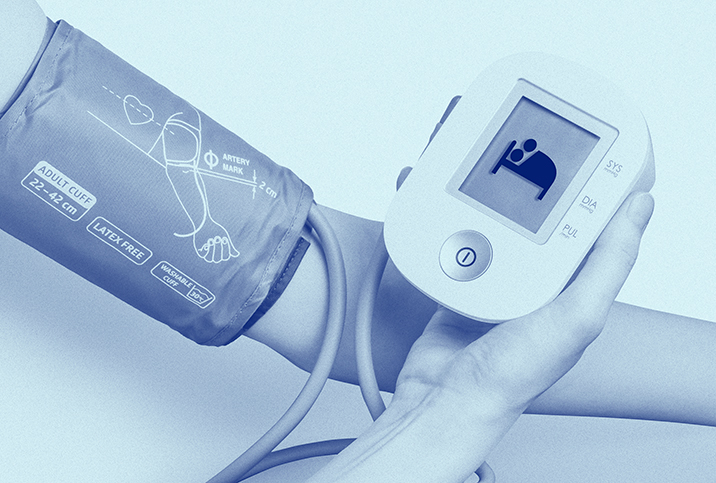Self-Monitoring Blood Pressure Has No Benefit in High-Risk Pregnancies
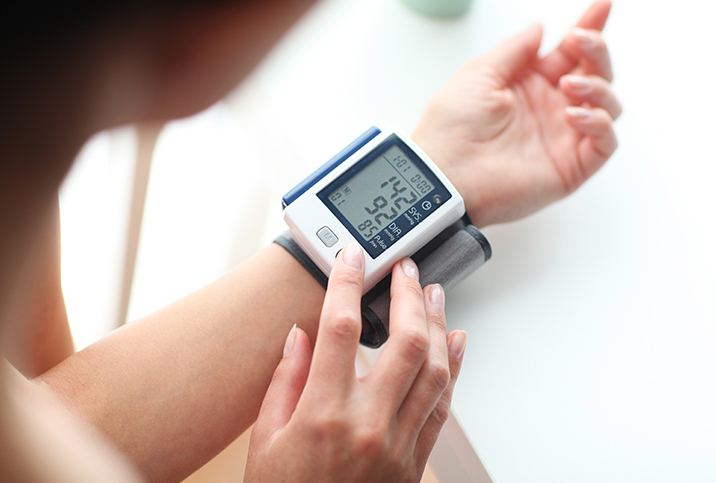
High blood pressure in pregnancy can cause a host of potential issues for mother and baby, and some women may find reassurance from tracking their blood pressure at home. New research, however, has found self-monitoring may offer no benefits.
I developed high blood pressure during both of my pregnancies. I diligently monitored my readings at home, but still wound up with preeclampsia and premature babies. I had assumed if I was carefully keeping track of my blood pressure readings, I could "catch" any concerns early and prevent any issues that could negatively impact my health and the health of my babies.
Turns out, that's not quite the way it works.
Two recent corresponding randomized clinical trials, known as BUMP-1 and BUMP-2, didn't find any real benefit to self-monitoring blood pressure for women considered at high risk for high blood pressure in pregnancy.
The studies' findings
These two studies, both published in 2022 in the Journal of the American Medical Association (JAMA), looked at pregnant patients who had an increased chance of developing high blood pressure, or hypertension, during pregnancy.
In the BUMP-1 trial, people with an increased risk of preeclampsia who checked their blood pressure at home didn't show a difference in the timing of being diagnosed with preeclampsia compared to those who received the usual medical care. Preeclampsia is a pregnancy complication marked by high blood pressure and high levels of protein in urine.
In the BUMP-2 trial, people who had chronic or gestational hypertension didn't have a significant difference in their average systolic blood pressure compared to those who received the usual medical care. Chronic hypertension is high blood pressure prior to pregnancy, while gestational hypertension is high blood pressure that started during pregnancy.
It's important to note that both of these trials focused only on pregnant people who had higher chances of severe high blood pressure or preeclampsia and not patients who were at low risk.
Monitoring blood pressure in pregnancy
High blood pressure can be a marker for preeclampsia, said Kevin Alten, M.D., an OB-GYN in Cambridge, Ohio. Preeclampsia affects around 5 percent to 8 percent of people who are pregnant. The condition can progress quickly, causing harm to both the mother and the baby. It can also cause seizures and strokes, usually developing in the third trimester.
But even if you don't get diagnosed with preeclampsia, high blood pressure can still decrease blood flow to the placenta, causing the fetus to not get enough oxygen or nutrients.
Once my blood pressure started creeping up at the start of the third trimester of my first pregnancy, I went on medications and increased my visits to my OB-GYN. They told me to start keeping track of it at home, giving me parameters for when I should call them.
"While the clinical outcomes [of the studies] measured may not have shown a statistically significant difference, we do not yet know if home blood pressure monitoring could reduce outcomes such as seizure or stroke," said Diane Christopher, M.D., an OB-GYN at the University of Colorado.
Christopher and her colleagues look at each patient's individual risk factors when deciding who should monitor their blood pressure at home. These risk factors include:
- History of hypertension, or hypertension in pregnancy
- History of preeclampsia
- Diabetes
- Kidney disease
"Providing a patient a cuff also provides more blood pressure readings so we can have a better idea of what is occurring over time," Christopher said.
She also explained some patients can experience "white coat" syndrome where a person's blood pressure is higher in the doctor's office than it is at home. When someone takes their blood pressure in the comfort and familiarity of their own home, it can be more accurate.
This was the case with my first pregnancy. However, it didn't go quite the same with my second.
Beyond home monitoring
After a prolonged hospital stay where my blood pressure was elevated more often than not, I came to associate a blood pressure cuff with a sign my pressure was sky-high. Therefore, home monitoring with my second pregnancy didn't go well.
It was a vicious cycle I created for myself, as Alten acknowledged. People can become so focused on the reading that they get anxious, and if you're anxious, your blood pressure increases.
"I think that's why the studies of home blood pressure monitoring had not been proven to help, because people get so anxious about it and that's the only thing they think about," said Alten, who doesn't routinely recommend people check their blood pressure at home if he's concerned about preeclampsia developing. "If I'm worried, I'm going to watch people more closely myself and have them come to the office."
Signs of preeclampsia, other than hypertension, include nausea, headache, elevated liver enzymes and low platelets. Preeclampsia can develop before high blood pressure is even detected.
"If [people] do their pressure at home and it's high, I can't tell them if this [is] gestational hypertension or preeclampsia without checking their urine or asking them about symptoms," Alten said. "Again, the research has never shown [home monitoring] makes a difference."
Preeclampsia is about more than just blood pressure. Alten warned that if someone has a normal home blood pressure reading but is experiencing increased swelling or a headache, they could ignore those warning signs and not go to a doctor when they should.
More research needs to be done on home blood pressure monitoring and whether it can prevent complications for mother and baby. While it doesn't hurt to check your blood pressure at home, it shouldn't take the place of prenatal care from your provider.
I'm lucky that my two children didn't have any lasting effects because of my complications. And it makes me feel better knowing there was nothing I could have done differently to prevent preeclampsia both times. But it just goes to show that elevated blood pressure needs to be taken seriously during pregnancy, whether you check your readings at home or not.












